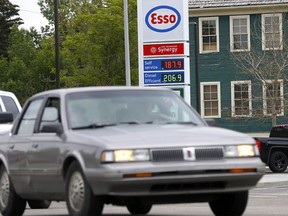Dan McTeague, president of Canadians for Affordable Energy, said gas stations in Calgary are overcharging about 25 cents a liter.

.
Inflation jumped to 8.4 percent in Alberta in June 2022 due in large part to the cost of fuel.
Announcement 2
.
The cost of fuel rose 13.5 percent in June, contributing just three percentage points to the rise in inflation from 7.1 percent at the end of May. By comparison, inflation in Canada rose 0.7 point to 8.1 percent.
The price of gas remained high in July despite the fact that the value of West Texas Intermediate fell almost $10 per barrel. However, this has not been fully reflected in the price at the pump.
.
Dan McTeague, president of Canadians for Affordable Energy, said gas stations in Calgary overcharge about 25 cents a liter when you consider how much fuel costs them.
“Someone is slowing the slide, and that…goes directly to the bottom line for gas stations,” he said. “That will have an inflationary impact that is more magnified in western Canada because of this practice by many gas stations of retaining those dips, those declines.”
Announcement 3
.
The former Liberal MP pegged the wholesale cost of gas in Calgary at 115.2 to regulate on Wednesday. Then gas stations have to add a federal excise tax of 10 cents per liter and 11.05 cents for the carbon tax, which equals 21.05 cents per liter; with five per cent GST brings it to 143.6 per litre. The rest is marked. With regular gas at 181.9 in Calgary, that means there’s 38.3 cents per liter of markup. He said 12 cents a liter is considered a good retail markup and 15 is almost unheard of: Montreal is at 8 cents a liter, Toronto is at 8.5 and Vancouver is at seven.
.
The UCP government eliminated the provincial tax on gasoline in April, but as the price of gasoline fell for service stations during the last month, its price for customers has not kept pace.
Announcement 4
.
Toronto, which still has higher provincial taxes on its gas and a higher wholesale price, has a lower average price at the pump than Calgary.
“If they were making 15 cents a liter on a day like today … they shouldn’t be charging more than 158.9 a liter, not 181.9,” McTeague said. “This is not in anyone’s interest. None at all.”
He said any kind of price lag should have been made up for long ago. This isn’t just happening in Calgary either, but in Alberta and Saskatchewan.
I wouldn’t go to the point of saying that regulation is needed, but rather that the provincial government needs to pull apart the main players and call them in.
-
‘Pretty plucked’: Gas prices higher than they should be in Calgary, expert says
-
Alberta to extend gas tax cut as electricity rebate expected to reach customers in July
The price of transport was not the only contributor to the increase in the cost of living.
ad 5
.
Shelter was the next largest contributor in Alberta, adding 2.2 percentage points to the total, primarily due to rising utility costs, especially electricity and natural gas prices, which increased by 30.9 and 54, 6 percent, respectively, year over year.
The real estate sector has slowed in recent months, largely due to rising interest rates, which received another one percent increase last week from the Bank of Canada.
Rising interest rates will also affect any variable rate loans, lines of credit or credit cards, as well as those who renegotiate their mortgages.
These costs have been passed on to renters with recent reports indicating that the average rental cost in Calgary increased by as much as 21 percent this year.
ad 6
.
Anupam Das, an economics professor at Mount Royal University, said that while this helps cool down some segments, it puts a lot of pressure on households to make up the difference in their budget.
In many cases, difficult decisions are made, especially when the cost of food is also rising, contributing 1.2 percentage points to inflation.
“For many people, they have reached a breaking point,” he said. “We also need to understand that although inflation is rising, our wages and salaries are not increasing at the same rate.”
Inflation is not only controlled by the interest rate. There are other global pressures that different levels of government have little control over, such as the Russian invasion of Ukraine, droughts and other weather events, and supply chain disruptions in other countries.
Despite other positive signs of recovery, such as unemployment falling to its lowest levels since 2015, there is growing concern that all of this could lead to another recession, although Das said that is difficult to predict.
“It’s a good balance that everyone has to maintain,” he said.
Twitter: @JoshAldrich03


